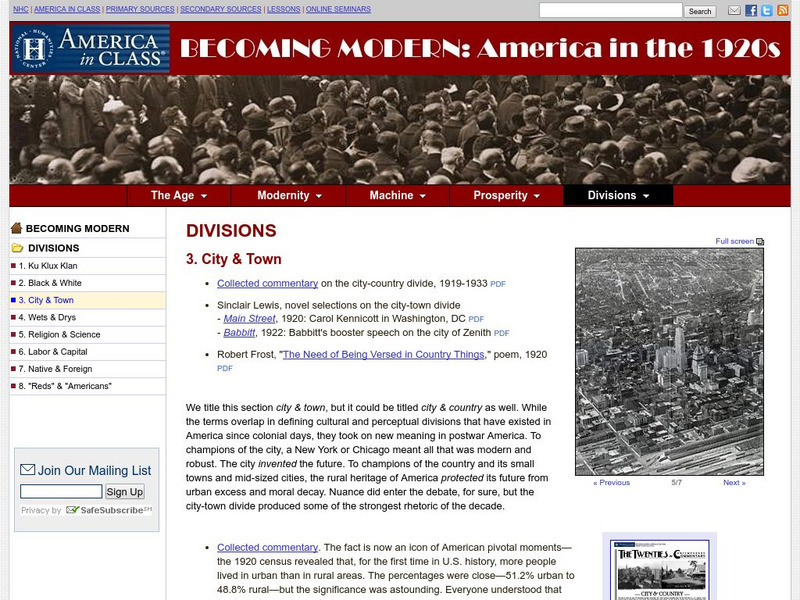Curated OER
Effects of Urban Growth
Learners explore population growth in the United States and the impact it has had on society. First, they brainstorm the reasons for population growth and the results of these increases. Then, they design surveys, record results, and...
Skyscraper Museum
Changes in a City Over Time
Investigate the growth and development of New York City with the final lesson in this four-part series on skyscrapers. Learners first explore the concept of urban growth by looking closely at a series of three paintings made of Wall...
Skyscraper Museum
Designing a Skyscraper
Besides serving as awe-inspiring monuments of human achievement, skyscrapers are built to perform a wide range of functions in urban communities. The second lesson plan in this series begins by exploring the history of the Empire State...
Curated OER
Urban Ecosystems 2: Why Are There Cities? A Historical Perspective
Students investigate the importance of food surpluses to the historical development of urban ecosystems.
Curated OER
Urban Ecosystems 3: Cities as Population Centers
Students discover that throughout history cities have been centers of population but that human exploitation of fossil fuels was key to the growth of large cities worldwide. They research urban growth through a number of websites.
Curated OER
Urban Growth in Industrial America
Young scholars examine the correlation between urbanization and industrialization. In this 19th century American history lesson, students investigate census data from the late 1800's to find out how urbanization and industrialization in...
Curated OER
Open Cities: Migration
In this open cities: migration worksheet, 10th graders identify European cities on a map and from photographs, answer 13 questions about the cities, complete 5 sentences and write 7 examples of urban growth.
Curated OER
You Don’t Know What You’ve Got Until It’s Gone: The Changing American Landscape
Students examine the changing American landscape. In this cause and effect lesson plan, students listen to rock music that exemplifies urban growth in America and the interconnectedness of America today. Students write cause and effect...
Curated OER
Calgary Response to Growth
Students read about some of the ways that the city of Calgary has responded to urban growth. They determine that seemingly simple decisions about how to curtail growth are, in fact, quite challenging. They critique and propose some...
Curated OER
Bay Area Urban Growth
Students analyze the arguments for and against urban growth boundaries. They identify a number of perspectives on the issue and find evidence to support each position. For homework, they write about their own position on urban growth...
Curated OER
The Growth Of A City
Students define what a city is. They investigate the top 10 - 15 most populated cities. SDescribe factors influencing the location and growth of urban sites. They site examples of cities that have grown with different models of urban...
Curated OER
What Is Smart Growth?
Students practice planning for the development of an area using the goals of Smart Growth as a guide. They analyze how regions can affect government policies. They role-play citizens who recommend how an area should be developed.
Curated OER
A Picture Is Worth A Thousand Words
Students complete a population pyramid for a city they are studying. They may complete a population pyramid for their city and another one for the country in which the city is located. They compare and contrast the results of the two...
US Geological Survey
U.s. Geological Survey: Land Use History and Changing Landscapes
This resource provides links that overview the history of land use in the United States. Numerous satellite images of different areas are provided.
Other
City of Vancouver: Urban Planning Department
The Planning Department of Vancouver is responsible for advising the municipal government on present and future development plans. There is information here about zoning, urban planning, heritage buildings, livability issues, etc.
National Humanities Center
National Humanities Center: America in Class: America in the 1920s: City & Town
The National Humanities Center presents collections of primary resources compatible with the Common Core State Standards - historical documents, literary texts, and works of art - thematically organized with notes and discussion...
Rock and Roll Hall of Fame
Rock & Roll Hall of Fame: Sti Lesson 15: The Changing American Landscape
The rise of American cities between 1865 and 1900 was spawned by the industrial revolution. Technological advancements in industry and transportation fathered the enormous growth of large cities across the United States. This led to the...
Khan Academy
Khan Academy: What Is Urban Growth?
How were cities formed? This article explains the formation of cities starting from the neolithic revolution to current times. It addresses such topics as urbanization, suburban sprawl, and urban growth models.















